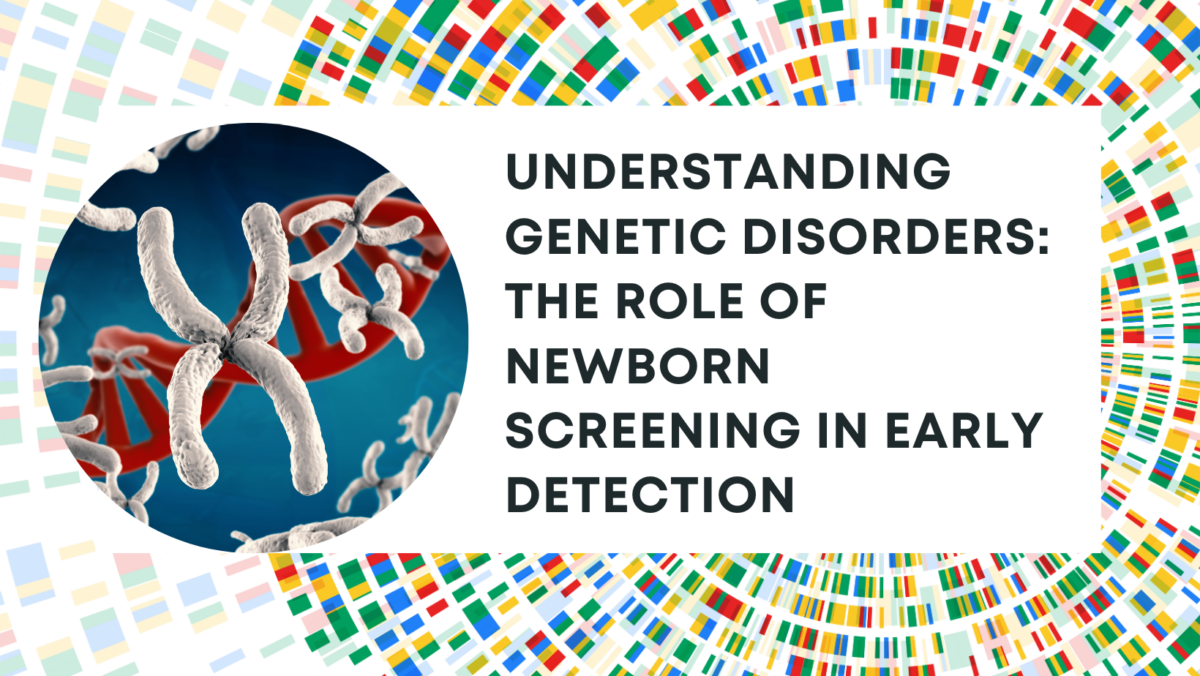An abnormality in a person’s genes or chromosomes results in a wide range of medical diseases known as genetic disorders. A person’s health and development may be influenced by these illnesses, which can appear at any stage of life. The living quality of those who are impacted and their families can greatly improve by early detection and care. Early identification of genetic diseases in newborns is crucial for prompt intervention and treatment. And newborn screening, a potent and crucial public health initiative, plays a key part in this process. Let’s discuss what is the role of newborn screening in early detection.
Monitoring of Newborns:
Early on after birth, newborns are tested for several genetic, metabolic, and congenital conditions as part of a systematic and comprehensive public health program called newborn screening. Newborn screening’s main objective is to find infants who, despite seeming healthy at birth, may have a higher chance of contracting specific diseases. The outcomes for affected newborns are considerably improved by early discovery by newborn screening, which enables prompt interventions and treatment.
Simple blood sampling from the baby’s heel that required for the screening process, and the sample is then sent to a lab for analysis. Most of the illnesses that are considered in newborn screening are not visible at birth and may not exhibit symptoms for several years. When these illnesses are caught in the early stages, medical personnel have a window of opportunity to act before irreparable harm is done.
What Exactly Are Genetic Diseases?
Genetic disorders are illnesses brought on by variations or mutations in the DNA sequence of a person’s genes. The function of crucial proteins, enzymes, or other substances that are essential for the body’s proper growth and operation can be affected by these transformations. Genetic abnormalities can range in nature and severity from minor to life-threatening.
Thousands of genetic abnormalities are known to exist, and they can affect almost every area of human health, including metabolism, immune system performance, neurological growth, and physical traits. Cystic fibrosis, sickle cell anaemia, Down syndrome, and muscular dystrophy are well-known examples of genetic illnesses.
Technological Developments In Newborn Screening:
Newborn screening programs continue to change and grow as a result of developments in technology and medical research. In the past, screening procedures focused on looking for certain markers or metabolites linked to particular illnesses. However, more recent techniques, like tandem mass spectrometry, allow for the examination of numerous conditions at once from a single blood sample.
Additionally, by making it possible to analyze a newborn’s full genome, next-generation sequencing (NGS) has created new opportunities for newborn screening. NGS offers the ability to detect a wider variety of genetic abnormalities, including those with unusual or subtly manifested symptoms, hence boosting the efficacy of newborn screening programs.
Efforts and Moral Issues to Consider
Although neonatal screening is quite effective, there are some difficulties and moral issues to be aware of. The advent of new screening procedures may cause some people to have reservations about the possibility of false positive results and unwarranted distress for families. Furthermore, it takes specialist knowledge to evaluate the outcomes of complicated genetic tests, and it can be difficult to guarantee that medical staff members appropriately prepare in this field.
Data from newborn screening tests are stored and used for research. To keep the public’s trust in these projects, a balance must be struck between protecting privacy and expanding medical knowledge.
Maladies Screened For During Newborn Screening:
Different countries have different illnesses that are included in newborn screening. However, numerous programs focus on a core group of disorders for which there are effective treatments. Typical examples are galactosemia, maple syrup urine disease, and metabolic diseases like phenylketonuria (PKU), etc. If left untreated, these disorders can cause significant intellectual and physical problems. However, they can manage with early diagnosis and dietary changes.
In addition, congenital hypothyroidism, which affects how well the thyroid gland works, and sickle cell disease, a blood illness, are frequently covered by newborn screening. Infants with these disorders can be given the proper medical attention and interventions to avoid consequences if these conditions are discovered early.
Conclusion:
To detect genetic abnormalities early and provide treatment, newborn screening is an essential part of public health activities. The long-term prognosis for those who are afflicted is considerably improved when healthcare providers can recognize at-risk infants soon after birth and begin timely treatment and assistance. Newborn screening programs are probably going to get even better as science and technology continue to improve, opening the door to a healthier future for our children. If you are looking for an expert newborn screening test west in Yorkshire, contact Miracle Inside. A broad range of early pregnancy scans, reassurance scans, and 3D/4D baby ultrasound scan packages tailored to different stages of your pregnancy are available to customers at Miracle Inside.
